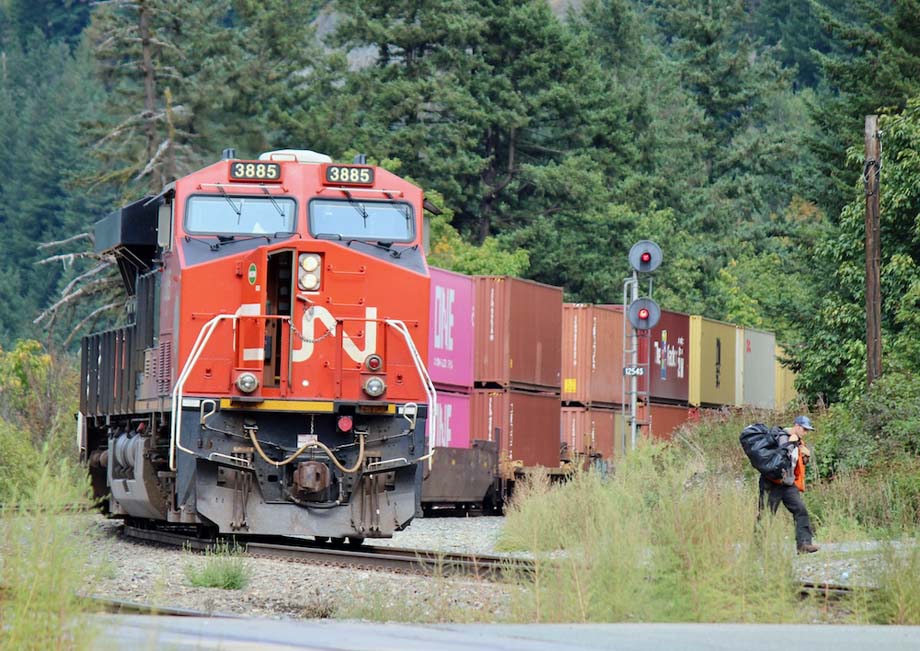
Canada - The union representing CN and CPKC engineers and conductors in Canada has authorized a
strike vote as labour and management remain far apart on new contracts.
Leaders of the Teamsters Canada Rail Conference (TCRC) told their members on Thursday that a strike vote will be held
from 8 Apr 2024 to 1 May 2024.
If the rank and file vote to authorize a strike, the earliest a walkout or lockout could occur on CN and CPKC in Canada
is 22 May 2024.
After being unable to reach agreements during negotiations that began last fall, labour and management since 1 Mar 2024
have been negotiating with the help of federal conciliators.
Also still negotiating, CPKC rail traffic controllers who are represented by TCRC in Canada.
Both CN and CPKC have proposed abolishing the traditional mileage-based pay system for train and engine crews and
replacing it with an hourly wage.
Both railways also say they want to create predictable work schedules for train crews, including scheduled days off,
that would meet tighter Transport Canada Duty and Rest Period Rules that went into effect last year.
"During the conciliation period, the parties will continue meeting to reach a negotiated agreement, and it remains
our goal to work towards a negotiated agreement that is good for our employees, customers, and the economy," CN
said in an update last week.
"We value our relationship with unions representing CN employees and will continue to negotiate in good faith with
the TCRC union leaders. Additionally, CN remains committed to modernizing the contract to ensure employees are
satisfied, both with financial compensation, and with work-life balance."
CN says its hourly wage proposal would boost engineer pay by an average of 15.5 percent while including guaranteed
minimum annual earnings.
Train crew schedules would include either two or three consecutive days off.
CPKC has offered similar options for renewed contracts:
Option 1: "The first delivers significant pay increases and improved work-life balance with scheduled,
predictable, days off through a dramatically simplified system.
The offer presents a progressive, modern time-based pay model that delivers improved benefits for
employees."
Option 2: "With the exception of our proposal amending the held away from home provision for train crews, the
second option offers competitive wage increases that are consistent with recent settlements and maintains the status
quo for work rules within the new Transport Canada regulatory framework for rest."
CPKC says the proposals recognize the needs of an evolving workforce, the railway's customers, and Canada's supply
chains.
"If redundant and archaic work rules are dissolved, employees would benefit from a modern agreement that enables
higher wages and predictable, scheduled, time off, while fully complying with new regulatory requirements for
rest," CPKC says.
"After years of disruption caused by a pandemic, natural disasters, other labour disruptions, and political events
both in Canada and around the world, the North American supply chains we collectively serve require stability and
predictability," CPKC says.
"Canada's supply chains simply cannot tolerate endless uncertainty from stalled collective
bargaining."
The TCRC says the CN and CPKC hourly rate proposals would mean a pay cut for half of their membership, strip away
"every quality of life provision attained through years of fighting," and make seniority redundant by
eliminating the distinction between road and yard crews.
The union also says that the railways aim to strip collective agreements of what it calls "safety-critical rest
provisions."
"The specific articles are meant to help ensure workers are rested enough to operate a train. The science on crew
fatigue is settled and the threat is real. Our union will not bargain with Canadian lives," TCRC spokesman
Christopher Monette says.
"Claims by CN and CPKC that the companies are proposing predicable work schedules are also inaccurate," he
adds.
"Instead, both CN and CPKC have proposed 12 hour calling windows, during which workers could be phoned up at any
time and expected to go operate a train for another 12 hours.
This could easily become dangerous if a person who woke up at 07:00 is called for a 12 hour shift at
17:00."
In an update to members last week, TCRC said no progress has been made on contract talks.
The union also claimed CN and CPKC are negotiating in bad faith, in violation of Canadian labour laws.
More talks are scheduled this month.
TCRC's contract with the railways expired at the end of 2023 but remains in force until new deals can be reached and
ratified.
The union represents 6,000 CN engineers and conductors and 3,200 CPKC engineers and conductors.
A strike would halt the shipment of $1 billion worth of goods in Canada per day, according to RailState, a company that
monitors freight trends across Canada using a network of sensors located near CN and CPKC main lines.
"After a complete shutdown, or even more minor disruption, rail customers cannot rely on the railroads to expand
capacity to make up for shipments that were missed during a shutdown," RailState said in a report last
month.
"There is no extra service coming in to save the day."
RailState advised rail customers to ship early, find alternative routes, or shift to trucking in order to avoid
disruption from a potential strike.
Author unknown.
(likely no image with original article)
(usually because it's been seen before)
provisions in Section 29 of the
Canadian Copyright Modernization Act.
